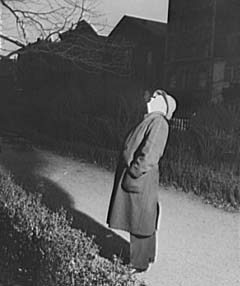War of the Worlds 1938
Radio drama produced by the Mercury Theatre on the Air, broadcast live on CBS October 30, 1938, 8-9 pm EST mono sound, 60 mins.
|
Many listeners tuned in late and began listening here.
|
Production:
- Produced and Directed by Orson Welles
- Radio Script written by Howard Koch and orson Welles, based on the 1898 novel by H.G. Wells
- Music by Bernard Hermann Orchestra
Notes
Orson Welles had risen to quick fame as a stage actor and playwright. He was only 16 when he starred as an actor in the Dublin theater, then toured the U.S. as a Shakespearian actor at age 17, and became a writer-producer at age 19 in Woodstock. When he was in New York starring in Romeo and Juliet in 1935, he was hired to do voices for the March of Time weekly radio documentary. He became the voice of the popular radio mystery show, The Shadow, and in the fall of 1935 at age 20 he joined John Houseman as a director of the federal Negro Theatre Project. His success in staging an all-black version of Macbeth led to the start of Project 891 in the Federal Theatre Project to produce classic plays with black actors in the Maxine Elliott Theater in midtown Manhattan. Welles loved the stage and yearned to start his own theater company. It finally became a reality in Feb. 1937 with Houseman after government funds were withdrawn from their Project 891. The new company was named after a magazine American Mercury lying on the table in Welles's Sneden's Landing house. The magazine had been founded by H. L. Mencken and George Jean Nathan. The first production was Julius Ceasar, played on a bare stage in modern dress as The Cradle Will Rock had been staged by Marc Blitzstein at the Venice Theater July 16, 1937. Welles would present Ceasar as a Mussolini, and Ceasar's Rome would be Fascist Italy; the subtitle of the play was "Death of a Dictator" but Welles would deny any parallels in public. Welles wrote and directed and played Brutus. The play opened Nov. 11, 1937, and attracted audiences and received rave reviews. Columbia Records arranged to record a performance, and the Mercury Theatre became the first professional company in America to have a complete play recorded to disc. After Welles appeared on the cover of Time magazine May 9, 1938, CBS offered him a weekly series of dramatic broadcasts. Welles would be the narrator and play a role in each show. The Mercury Theatre would create each production separate from its live theater presentations. Classic novels were adapted for shows: Treasure Island, Alice's Adventures in Wonderland, and the 1897 Dracula novel of Bram Stoker that had already been filmed in 1923 as Nosferatu and in 1931 with Bela Lugosi as Dracula. The inaugural program July 11, 1938, called "First Person Singular," was introduced by announcer Dan Seymour at 9 pm as "the first production of a unique new summer series by the Mercury Theatre of the Air." (p. 140) It presented the Dracula story, with Welles playing Count Dracula, Agnes Moorehead playing Mina, Ray Collins as the Russian captain, George Coulouris as Dr. Seward. The next week was Treasure Island, followed by A Tale of Two Cities, then The 39 Steps, and soon the title "First Person Singular" was dropped in favor of the Mercury Theatre of the Air. Welles presented Abraham Lincoln on the evening of Aug. 15, 1938, just 90 minutes before FDR's radio address. The second season of the radio series began in the fall of 1938 on Sunday evenings 8-9 pm, opposite The Chase and Sanborn Hour with Edgar Bergen and Charlie McCarthy. The first show was a radio adaption of Julius Caesar with H. V. Kaltenborn as narrator, already working at CBS in Studio Nine, and easily able to go downstairs to Studio One for Welles's show. The shows that followed included Jane Eyre, Seventeen, Around the World in Eighty Days. Welles decided to do War of the Worlds, having read the story in 1936 from a pulp magazine that reprinted the Pearson's Magazine serial version. Only a few science fiction stories had been broadcast on radio, notable the children's program of Buck Rogers in the 25th Century, but Welles wanted to do an adult story. He purchased the radio rights to H. G. Wells's story and modernized it for 1938. At the end of his Oct. 23 show of Around the World in 80 Days, he announced that next week he would broadcast War of the Worlds. The young playwright Howard Koch was assigned to write the script on Oct. 24, and given only 6 days to do the job. Welles wanted the show for Halloween Eve, the perfect day to spoof radio. Later Wells would explain, "Radio in those days, before the tube and the transistor, wasn't just a noise in somebody's pocket - it was the voice of authority. Too much so. At least, I thought so. It was time for someone to take the starch out of some of that authority: hence my broadcast." (p. 164).
 CBS broadcast "Air Raid" Oct. 27, 1938
|
|
Orson Welles speaking at press conference from
Universal Newsreel |
Sources:
- quotes from from Brady, Frank. Citizen Welles: a Biography of Orson Welles. New York: Scribner, 1989.
- Radio Script of the 1938 Mercury Theatre Broadcast
- Mercury Theatre on the Air
- War of the Worlds Historical Perspective
- War of the Worlds 1953 film
- War of the Worlds 2005 film